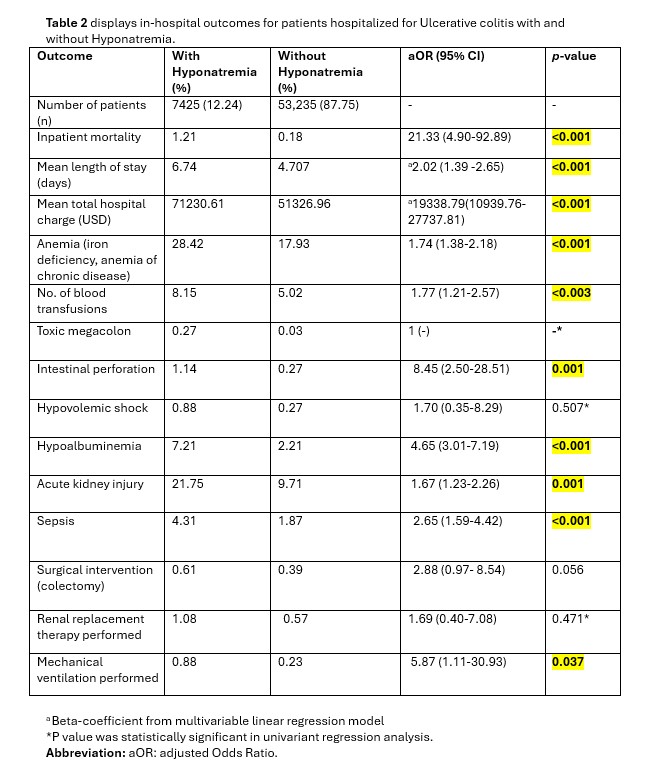Tuesday Poster Session
Category: IBD
P5456 - Impact of Hyponatremia on Mortality and Other In-Hospital Outcomes in Patients With Ulcerative Colitis (UC): A Retrospective Cohort Analysis Using the National Inpatient Sample
Tuesday, October 28, 2025
10:30 AM - 4:00 PM PDT
Location: Exhibit Hall
- HT
Hamza Tahir, MD (he/him/his)
Jefferson Einstein Hospital/Thomas Jefferson University
Philadelphia, PA
Presenting Author(s)
Hamza Tahir, MD, Bakhtawer Siraj, MD, Tinsae Anebo, MD, Nandakumar Mohan, DO, Oluwanifemi Balogun, MD, Michael Goldberg, DO
Jefferson Einstein Hospital/Thomas Jefferson University, Philadelphia, PA
Introduction: Hyponatremia can be an associated electrolyte abnormality in patients with ulcerative colitis (UC) owing to the inflammatory processes, increased fluid loss through diarrhea, and medications used to treat UC. The aim of this study is to assess the impact of hyponatremia on outcomes of patients hospitalized with ulcerative colitis using a large national database.
Methods: The US National Inpatient Sample (2018-2020) was analyzed to identify patients hospitalized with UC, with and without hyponatremia using ICD-10 codes. Confounders were adjusted by using multivariable regression analysis. The primary outcome was in-hospital mortality, and the secondary outcomes were mean length of stay (LOS), mean total hospital charges (THC), anemia, blood transfusions, toxic megacolon, intestinal perforation, hypovolemic shock, hypoalbuminemia acute kidney injury, sepsis, colectomy and mechanical ventilation required.
Results: Among 60,660 hospitalized patients with UC, 7425 (12.24%) also had hyponatremia, and 53,235 (87.75%) were without hyponatremia. Patients with hyponatremia exhibited a statistically significant 21-fold increase in inpatient mortality (adjusted odds ratio [aOR] 21.33; 95% confidence interval [CI], 4.90-92.89; P < 0.001), along with an adjusted two-fold increase in mean length of stay (mean difference 2.02; 95% CI, 1.39-2.65; P < 0.001) and a rise in mean total hospital charges (THC). Moreover, the hyponatremia group had significantly higher rates of anemia, blood transfusions, intestinal perforation, hypoalbuminemia, acute kidney injury, sepsis, and mechanical ventilation (all P < 0.05). However, no statistically significant differences were found in the rates of toxic megacolon, hypovolemic shock, colectomy, or renal replacement therapy between the two groups.
Discussion: Hyponatremia, a common electrolyte disturbance in patients with UC, is associated with increased mortality, prolonged hospitalizations, elevated healthcare costs, and a higher incidence of complications relative to patients without hyponatremia. Early detection and prompt, effective management of this condition are critical for optimizing clinical outcomes in hospitalized individuals.

Figure: Table 2 displays in-hospital outcomes for patients hospitalized for Ulcerative colitis with and without Hyponatremia.
Disclosures:
Hamza Tahir indicated no relevant financial relationships.
Bakhtawer Siraj indicated no relevant financial relationships.
Tinsae Anebo indicated no relevant financial relationships.
Nandakumar Mohan indicated no relevant financial relationships.
Oluwanifemi Balogun indicated no relevant financial relationships.
Michael Goldberg indicated no relevant financial relationships.
Hamza Tahir, MD, Bakhtawer Siraj, MD, Tinsae Anebo, MD, Nandakumar Mohan, DO, Oluwanifemi Balogun, MD, Michael Goldberg, DO. P5456 - Impact of Hyponatremia on Mortality and Other In-Hospital Outcomes in Patients With Ulcerative Colitis (UC): A Retrospective Cohort Analysis Using the National Inpatient Sample, ACG 2025 Annual Scientific Meeting Abstracts. Phoenix, AZ: American College of Gastroenterology.
Jefferson Einstein Hospital/Thomas Jefferson University, Philadelphia, PA
Introduction: Hyponatremia can be an associated electrolyte abnormality in patients with ulcerative colitis (UC) owing to the inflammatory processes, increased fluid loss through diarrhea, and medications used to treat UC. The aim of this study is to assess the impact of hyponatremia on outcomes of patients hospitalized with ulcerative colitis using a large national database.
Methods: The US National Inpatient Sample (2018-2020) was analyzed to identify patients hospitalized with UC, with and without hyponatremia using ICD-10 codes. Confounders were adjusted by using multivariable regression analysis. The primary outcome was in-hospital mortality, and the secondary outcomes were mean length of stay (LOS), mean total hospital charges (THC), anemia, blood transfusions, toxic megacolon, intestinal perforation, hypovolemic shock, hypoalbuminemia acute kidney injury, sepsis, colectomy and mechanical ventilation required.
Results: Among 60,660 hospitalized patients with UC, 7425 (12.24%) also had hyponatremia, and 53,235 (87.75%) were without hyponatremia. Patients with hyponatremia exhibited a statistically significant 21-fold increase in inpatient mortality (adjusted odds ratio [aOR] 21.33; 95% confidence interval [CI], 4.90-92.89; P < 0.001), along with an adjusted two-fold increase in mean length of stay (mean difference 2.02; 95% CI, 1.39-2.65; P < 0.001) and a rise in mean total hospital charges (THC). Moreover, the hyponatremia group had significantly higher rates of anemia, blood transfusions, intestinal perforation, hypoalbuminemia, acute kidney injury, sepsis, and mechanical ventilation (all P < 0.05). However, no statistically significant differences were found in the rates of toxic megacolon, hypovolemic shock, colectomy, or renal replacement therapy between the two groups.
Discussion: Hyponatremia, a common electrolyte disturbance in patients with UC, is associated with increased mortality, prolonged hospitalizations, elevated healthcare costs, and a higher incidence of complications relative to patients without hyponatremia. Early detection and prompt, effective management of this condition are critical for optimizing clinical outcomes in hospitalized individuals.

Figure: Table 2 displays in-hospital outcomes for patients hospitalized for Ulcerative colitis with and without Hyponatremia.
Disclosures:
Hamza Tahir indicated no relevant financial relationships.
Bakhtawer Siraj indicated no relevant financial relationships.
Tinsae Anebo indicated no relevant financial relationships.
Nandakumar Mohan indicated no relevant financial relationships.
Oluwanifemi Balogun indicated no relevant financial relationships.
Michael Goldberg indicated no relevant financial relationships.
Hamza Tahir, MD, Bakhtawer Siraj, MD, Tinsae Anebo, MD, Nandakumar Mohan, DO, Oluwanifemi Balogun, MD, Michael Goldberg, DO. P5456 - Impact of Hyponatremia on Mortality and Other In-Hospital Outcomes in Patients With Ulcerative Colitis (UC): A Retrospective Cohort Analysis Using the National Inpatient Sample, ACG 2025 Annual Scientific Meeting Abstracts. Phoenix, AZ: American College of Gastroenterology.
